Recruitment day confronts drop in black male medical students
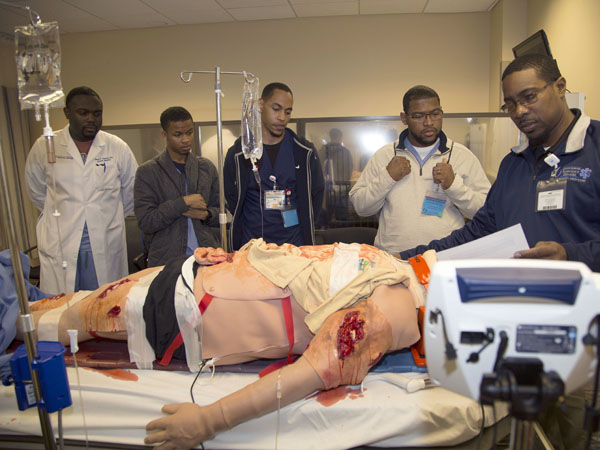
Published in News Stories on December 10, 2015
Michael Chiadika said his bid to get into medical school was like a quarterback throwing “a Hail Mary shot.”
Learning the ropes depended a great deal on luck and prayer.
Apparently, many African-American males like Chiadika have been there - to the point that they may be giving up on, or are not even trying, to become doctors: While the number of black male college graduates has risen, the number applying to medical school has sunk.
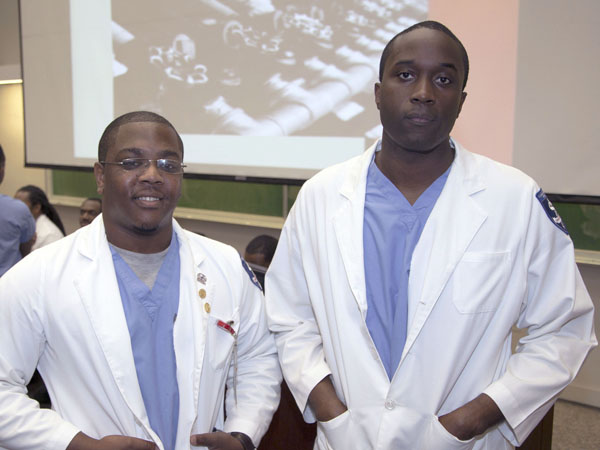
M2s, from left, Jeremy Stocks and Michael Chiadika
In an effort to find out why, and to do something about it, Chiadika of Jackson joined another second-year medical student, Jeremy Stocks of Jackson, to put together a first-of-its-kind campus visit that drew around 30 black male college and high school students to UMMC on Saturday.
“We want them to see black medical students and black doctors and know that we exist,” Chiadika said, “and know that they can do this, too.”
That message was the centerpiece of Saturday's African-American Male Student Recruitment Program, and an urgent one in light of this report: “Altering the Course: Black Males in Medicine”.
Presented this summer by the Association of American Medical Colleges (AAMC), it's a call to action based on the decline of black male medical-school applicants - from 1,410 in 1978 to 1,337 last year.
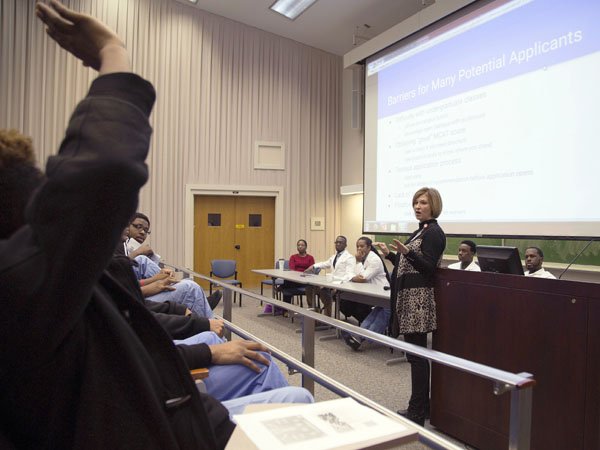
A student, far left, prepares to pose a question for Dr. LouAnn Woodward
The reversal is troubling to Dr. LouAnn Woodward, vice chancellor for health affairs and dean of the School of Medicine, who addressed the assembled students Saturday, urging them to “stay the course” if they decided to study medicine.
“When you decide where to go to medical school, I want you to come here,” she said. “I want everyone in this room to be part of the army that makes a difference in Mississippi.”
The number of African-American males enrolled in or graduating from medical school has also dropped. Such falloffs have touched no other minority group - a decrease blamed on such real or perceived barriers as limited knowledge about the career path, the high costs of medical school, and the lack of African-American male role models in medicine.
“We're losing prospective students in middle school,” said Lesley Edwards, director of medical school admissions.
Some of the specters raised by the AAMC report were broached by students during the recruitment program.
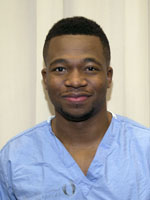
Lowe
“Many of us really don't know what it takes to get to medical school,” said Michael-Ryan Lowe, a biological sciences major at Mississippi State University. “I've done a lot of research about it, but an event like this really helps: 'This is the path I need to take.'”
Les Mills of Gluckstadt, who's in his mid-thirties, had shunned medical school for years in favor of a career as a paralegal. “Part of it was I lacked the feeling that I could accomplish this,” he said. “But I've begun to believe this is something I can do.”
Mills has received some helpful information from UMMC, he said. “But the more I can find out the better. I'm a sponge right now. And since I've been here on campus today, I've seen more people like me; outside, I don't get that so much.”
Reversing this nationwide trend is important for the sake of America's health, the AAMC reports: With a more diverse group of physicians, greater access to care is more likely for patients with low incomes, racial and ethnic minorities, people who depend on Medicaid, and more.
One way to recruit more black males to medical school is to let them “test drive” it, said Dr. Jerry Clark, chief student affairs officer and associate dean for student affairs in the School of Medicine. With help from other students and faculty, Chiadika and Stocks laid out a course.
“I'd had a meeting with the African-American male M2 students and was impressed with how they had handled the M1 challenge,” Clark said. “I told them about the AAMC report and they planned this program in response; this was student-driven.”
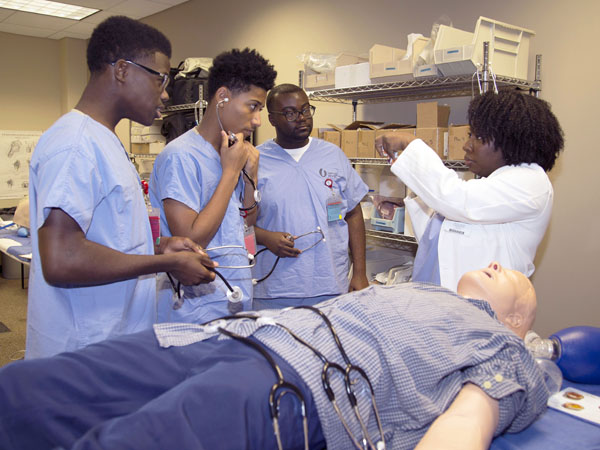
Danielle Parker, far right, Simulation Center coordinator, gives a lesson on ventilating a patient -- represented here by a mannequin -- to, from left, Murrah High School students Benjamin Knott and Myron Evans and Tevin Tillman, a University of Southern Mississippi student.
The daylong visit featured tours of the Gross Anatomy Lab, where medical students dissect human cadavers; the Emergency Department; and the Simulation (SIM) Center in the Classroom Wing.
Representing a half-dozen of Mississippi's universities and colleges and at least two Jackson high schools, the visiting students also heard from physicians, residents and medical students about how to prepare for, afford, survive and cherish medical school.
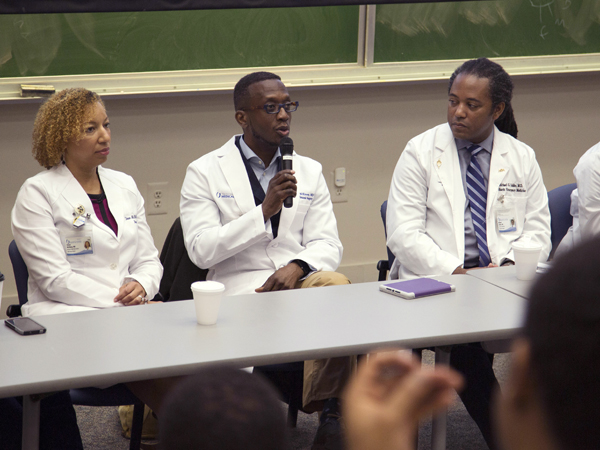
Among the panelists are, from left, Dr. Shawn McKinney, associate professor of surgery, Dr. Gerald McKinney (with microphone), associate professor of surgery, and Dr. Michael Holder, associate professor of pediatrics and executive director of simulation and interprofessional education.
Dr. Gerald McKinney, associate professor of surgery, addressed the myth of “the perfect student” - that is, that you have to be one to gain admission and graduate.
“There is no such thing as a perfect student,” he told the visitors. “We have some magna cum laudes, some summa cum laudes and some 'thank Lawdys.'”
Jamarius Waller of Brookhaven said, that as a first-year medical student, “I get a sense of, yes, I'm doing something great. It's a blessing to be in this classroom. It's not something I'll ever take for granted.”
Still, the panel of physicians and residents did not soft-pedal medical-school realities.
“Finishing it and your residency is a long process,” said Dr. Eric Davis, an internal medicine fellow. “When things are at their worst, you cannot quit.
“I just want you to be prepared for a fight, but you can win that fight.”
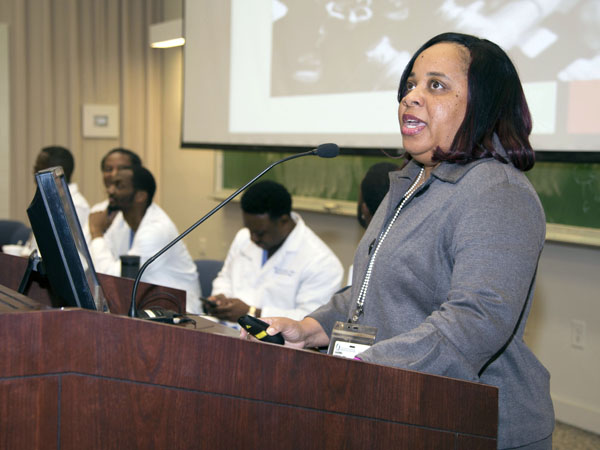
Dr. Gaarmel Funches, director of community education/outreach, describes pipeline, prematriculation and other programs that can help ease a student's entry into medical school.
Dr. Gaarmel Funches, director of community education/outreach, outlined programs that have made the fight easier for all medical students.
Among them is PREMAT (Prematriculation), a summer-time initiative that allows entering first-year students to get a head start on histology, biology and Gross Anatomy. “If you're going to pass out,” Funches said, “then get it over with and do it in the summer.”
Dr. Michael Holder, associate professor of pediatrics and executive director of simulation and interprofessional education praised PREMAT with a basketball analogy: “This is like being thrown an alley-oop and you have a stepladder.”
Similarly, organizers of Saturday's event hoped to give prospective students a leg up. As far as Myron Evans was concerned, it did.
“It's amazing,” said Evans, a Murrah High School senior. “It did change my view of how much I can do.”
Photos
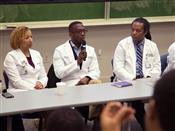 | State Medical Associations and Agencies American Academy of Pediatrics, Mississippi Chapter American Congress of OB GYN, Mississippi Section American College of Physicians, Mississippi ChapterMississippi Academy of Family PhysiciansMississippi Hospital Association Mississippi Medical and High Resolution Medium Resolution Low Resolution |
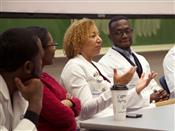 | High Resolution Medium Resolution Low Resolution |
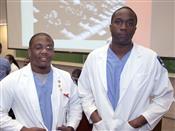 | National Medical Associations American Medical Association National Medical Association High Resolution Medium Resolution Low Resolution |
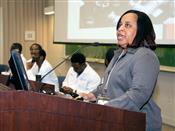 | High Resolution Medium Resolution Low Resolution |
 | Medical Schools University of Mississippi School of Medicine University of Mississippi Department of Family MedicineUniversity of Mississippi Department of Graduate Medical EducationWilliam Carey University College of Osteopathic Medicine High Resolution Medium Resolution Low Resolution |
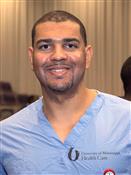 | High Resolution Medium Resolution Low Resolution |
 | Upcoming Meetings & Webinars Meetings American Academy of Family Physicians Annual Meeting September 20 24, 2016 Orlando, FL http High Resolution Medium Resolution Low Resolution |
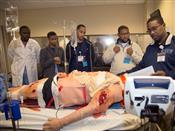 | High Resolution Medium Resolution Low Resolution |
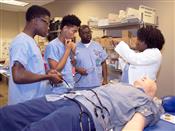 | High Resolution Medium Resolution Low Resolution |
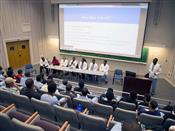 | High Resolution Medium Resolution Low Resolution |


